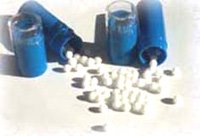Terms related to homeopathy
 Antidote – It is a substance or a medicine which modifies or opposes the effects of a remedy, i.e. Nux vom and Coffea ; Bell and Opium; Bryonia and Rhus tox.
Antidote – It is a substance or a medicine which modifies or opposes the effects of a remedy, i.e. Nux vom and Coffea ; Bell and Opium; Bryonia and Rhus tox.Characteristic Symptoms- It is the individualizing symptoms of a drug. In its complete expression it should belong to a drug alone.
Concordant Remedies- Drugs whose actions are similar but of dissimilar origin are said to be concordant and they follow each other well i.e. China and Calcarea; Pulsatilla and Sepia; Nitric and Thuja; Belladonna and Mercurius.
Complementary- A relation wherein one drug completes the cure which was commenced by another drug, i.e. Belladonna and Calcarea, sulphur and Nux vom, Apis and Natrum mur.
Drug- A substance which can alter the function or structure of a part or parts of the body is known as drug. It has the capacity to effect a change in the human or animals in health or disease.
Drug power- It is the amount of crude drug contained in it.
Generic symptoms- Generic symptoms are common or general symptoms present in various diseases. They are loss of appetite, weakness, and headache. They are of little value to the homeopathic physician.
Inimical Remedies- Drugs which have a relation of enmity towards each other or drugs having opposite actions which do not follows each others well are called inimical remedies. For example: Apis and Rhus tox; Phosphorus and Causticum; Silicea and Mercurius.
Materia Medica- Materia Medica is the study of drugs- medical materials for the cure of the sick. It is a book which contains the collected facts from different experimentations, clinical experiences, including their pharmacodynamics effects of the drugs and their method of application and doses.
Materia Madica Pura- A book written by Dr. Hahnemann himself is called as material madica pura. It is said a pura because it contains the pure or the most reliable effects of drugs so experimented on himself or to his followers under his supervision.
Mother Tincture- The strongest liquid preparation used in homeopathy and made by macerating of the drug or portion of it in alcohol or water.
Nosodes- The homeopathic designation for the morbid product of diseases when employed as remedies i.e. Psorinum, Ambra grisea, Tuberculinum.
Objective Symptoms- Are those which appeal directly to sense of the physician.
Subjective symptoms- A symptom which the patient experiences and can express in language are known as subjective symptoms.
Placebo- It is an inert preparation, usually of sugar of milk, given to the patient, while watching a case for development of symptoms or while permitting a previously administered drug to act undisturbed. It is also some times necessary in impatient cases.
Short acting remedy- A remedy whose action lasts for a comparatively long period, e.g. Aconite, Aethusa cynapium, Allium cepa, Avena sativa, Belladonna, Chamomilla, Colocynth, Ipecac etc.
Long acting remedy- A remedy whose action lasts for a comparatively long period, e.g. Anthracinum, Bacillinum, Calcarea flour, Carcinosin, Kali carb, Lachesis, Lycopodium, Mallandrium, Nat mur, Pertusin, Psorinum, Silicea, Sulphur, Tuberculinum, etc.
Therapeutics- It is the application of drug to diseases for their relief or cure, besides this, it includes all that relates to the science and art of healing by other remedial measures.

0 Comments:
Post a Comment
<< Home